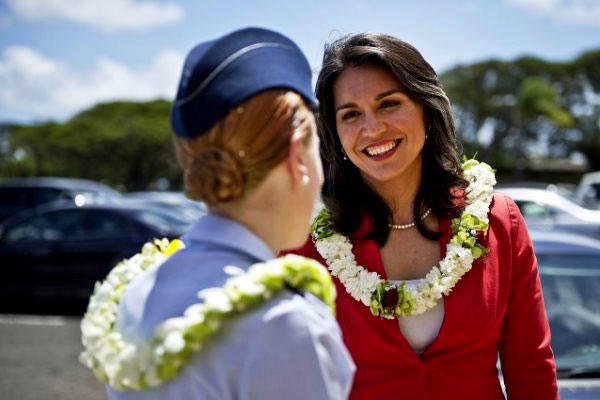Decades ago, serving in political office was a natural next step for those who served in the military.
Today, the veteran-turned-politician is a far rarer breed, at least at the national level. Stats show a steady decline in the number of veterans elected to Congress, raising concerns an important perspective increasingly is missing from the halls of Capitol Hill.
It's an alarm former Defense Secretary Chuck Hagel, a Vietnam veteran, rang at a networking event for vets on Capitol Hill last month.
"At a time when everything is hair-triggered, everything is nitroglycerin, and miscalculations can lead to a lot of trouble, we need veterans' input," he said, referring not only to the veteran void in Congress, but also the Executive Branch and beyond.
The 2012 election marked the first time in 80 years that neither major party presidential nominee had served in the military. Two years later, the 114th Congress was sworn in with the smallest proportion of veterans on record.
According to an October 2015 Congressional Research Service report, the high point was reached in the 92nd Congress (1971-72) when 73 percent of Congress had served in the military. Today, veterans make up 20 percent of the Senate and just 18 percent of the House of Representatives.Part of the reason is simply that, in the era of the all-volunteer force, far fewer Americans are veterans than during the post-World War II period.
"There are simply fewer veterans among the general population. Today, veterans only comprise about 9 percent of the adult population and after Vietnam, fewer members of the political elite looked to military service as a career path," said the American Enterprise Institute's Rebecca Burgess, co-author of a report examining veterans in public office.
Still, with Americans consistently ranking the military highly in public opinion polls, both political parties recognize the advantage a veteran candidate can bring. And there are exceptions to the trend-lines.
In 2012, solid victories by Arkansas' Tom Cotton, and Iowa's Joni Ernst, both veterans, helped the Republican takeover of the Senate. This year, Democrats heavily recruited Illinois Rep. Tammy Duckworth, a veteran, to challenge incumbent Sen. Mark Kirk.
Representatives from the Republican and Democratic congressional campaign committees would not specifically comment on their particular vet outreach efforts. But Sadie Weiner, spokeswoman for the Democratic Senatorial Campaign Committee (DSCC), said: "It is definitely something we encourage and I think regardless of which political party, Americans recognize the qualities and leadership skills of those who served. Those are qualities which can translate into public office."
According to Andrea Bozeck of the National Republican Senatorial Committee, there are eight veterans running in open contests this year, including Nevada Senate candidate Rep. Joe Heck, an Iraq War veteran. In Colorado, Navy veteran Ryan Frazier, retired U.S. Air Force officer Darryl Glenn and Iraq War veteran Jon Keyser are battling each other for the opportunity to challenge Democratic Sen. Michael Bennet.
Veterans weighing a run do have resources at their disposal, like the nonpartisan Veterans Campaign, which gives training for veterans considering a campaign. It offers workshops focused on issues like how to "bulletproof" your service record and how to avoid being characterized as just a "veteran candidate."
Jon Soltz, an Iraq War veteran and chairman of Votevets.org, a veterans group that supports progressive candidates for office, said part of the problem is military service is often not conducive to running in the modern political landscape.
Soltz said long deployments often prevent servicemembers from establishing a presence in a community or district, which is critical in terms of fundraising and developing a public profile with voters.
"They are at a disadvantage because they do not have the political and financial connections at the grassroots level that non-veterans do. That said, being a veteran also gives you a lot of pluses in terms of being respected," he told FoxNews.com.
In order for more veterans to make their way into public office, they may have to start small.
AEI's Burgess believes state legislatures reflect a more complete picture of veterans in public service and can serve as a useful pipeline for future members of Congress.
Veterans serve in the state legislatures of every state, and of 7,383 state legislators, 1,040 have military experience -- 260 state senators compared with 780 state representatives, according to AEI.
As veterans of Vietnam and World War II retire, veterans of the wars in Iraq and Afghanistan are slowly becoming more influential on Capitol Hill.
Although only one half of one percent of the U.S. population have been on active duty since those wars began, eight House members and two senators are serving in the Reserves, and six House Members and one senator are serving in the National Guard, according to the Veterans Campaign.
On Capitol Hill, veterans are even underrepresented among congressional staffs. Justin Brown, the founder of HillVets, told FoxNews.com vets account for approximately 3 percent of congressional staff members, a figure that reflects the high barrier they face.
"With two of the largest federal expenditures being defense and veterans - the two areas where we have a particular expertise, veterans are real assets to both the legislative and executive branches," he said. Hiring veterans "is not about charity or a jobs program," but about "taking their unique assets and skills and putting them to good use in government."
Related Video:





























